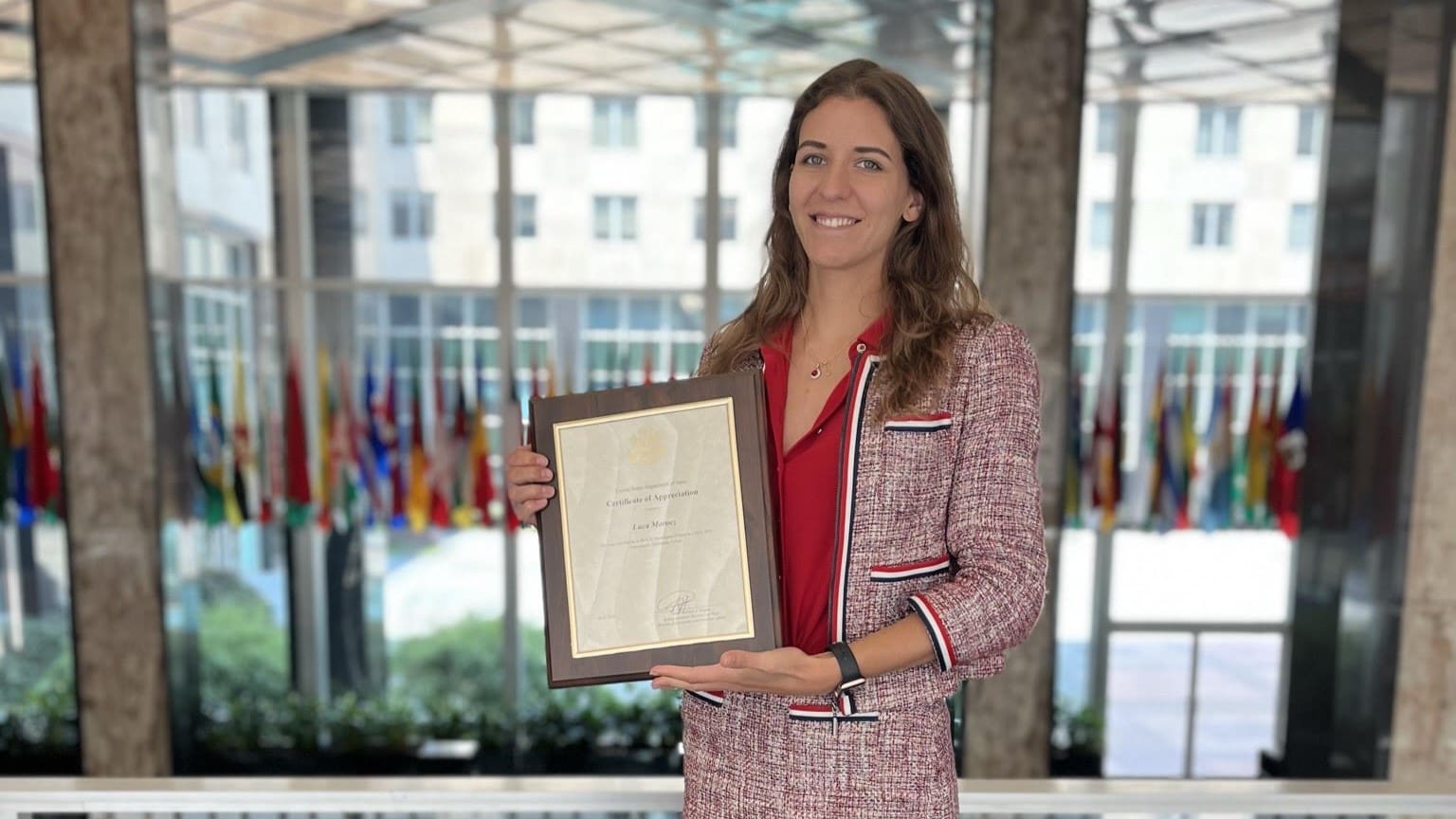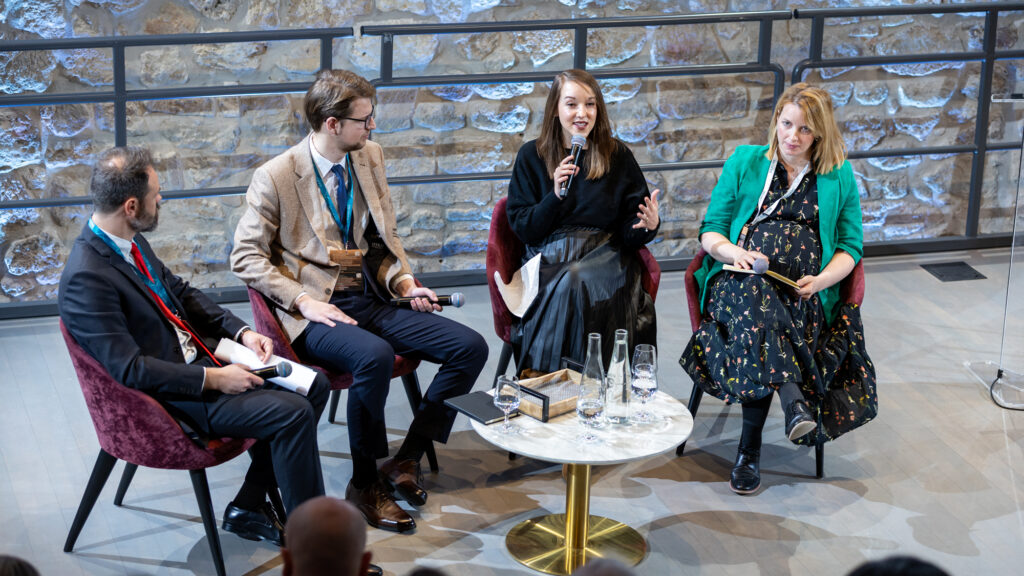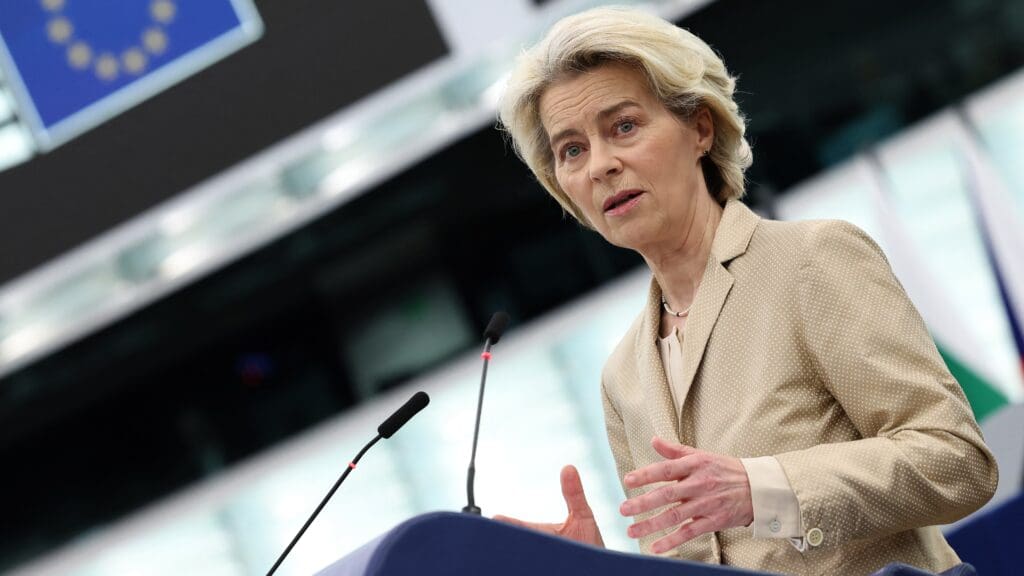Luca Mórocz came to the U.S. in 2017 as a Hungarian American Coalition (HAC) intern. She then embarked on an exciting professional journey including stints as the PR manager of the Ambassadors of the Future Gala in California and as a foreign exchange diplomat at the Hungarian Ministry of Foreign Affairs assigned to the U.S. State Department’s Global Coalition to Defeat ISIS. She is currently living and studying in Washington, DC, organizing various HAC events and a leadership training program that seeks to offer solutions to a common challenge of all Hungarian diaspora organizations: youth engagement and leadership transition planning.
***
When and why did you first come to the U.S.?
I arrived in 2017 as an intern of the HAC’s Leadership Training Program (LTP), renamed after its founder John N. Lauer, following his passing away in 2018. I was studying International Economics at the Budapest University of Technology and Economics (BME) at the time and I heard about the opportunity from a son of a friend who is an alumna. I was keen on gaining some experience abroad, and I pursued the Coalition’s LPT in the U.S. and an Erasmus scholarship opportunity in Italy. I was admitted to both but chose the first. I spent four months in Washington, DC where I completed my thesis on the tax policy of the newly elected U.S. President Donald Trump, allowing me to continue my university studies without interruption. During this time, I worked 20 hours a week as a marketing intern at the Global Entrepreneurship Network, and spent another 20 hours reaching out to various think tanks, political organizations, and NGOs. Many of their representatives reviewed my thesis and provided additional resources.
What was your first encounter with America as an undergraduate?
One of my first memories is of bus drivers greeting me and asking how I was. I thought they were serious and answered, but soon realized it was just a cultural difference. I appreciated the kindness and openness of people on the street, who would smile and compliment me or my clothes. Another positive experience I had in Washington, DC, was the serendipity of meeting people in interesting positions, often related to politics. No wonder I really wanted to come back. Initially, I thought I liked America, so in November 2018, I moved to Los Angeles for six months to volunteer for the Ambassadors of the Future Gala as a PR manager. This is a charity organization, founded by Ádám Béres and his parents, Dr. Zsuzsa Pekarovics and Dr. Attila Béres in 2017. It encourages young people to engage in volunteer activities and support international student exchanges. They raise the funds and distribute the proceeds to organizations, including the Coalition. During my time, we raised $30,000 to help a Hungarian student to study at the University of South California (USC). I loved the Gala and LA, and visited all the national parks in California. However, I realized that what I liked the most about my first visit to the U.S. was Washington, DC. I specifically planned my career to return there.
When and how did you manage to return to the U.S. capital?
Back in Hungary, I worked as a VAT analyst for two companies before transitioning to Mathias Corvinus Collegium (MCC) as an international relations expert. MCC often collaborated with the Hungarian Ministry of Foreign Affairs and Trade, and I soon had a chance to transfer to the Department for North America. In September 2021, I arrived in DC, for a one-year exchange diplomat position at the U.S. State Department. While there are classified levels that exchange diplomats cannot access, the program is managed professionally, having run for decades. I was assigned to the unit responsible for counter-ISIS activities. For six months, I served as an expert in charge of working groups, and for four months I was the acting working group unit chief until a permanent group leader was appointed. The Defeat ISIS Coalition of 85 countries united against ISIS. My role included managing the working groups and organizing their meetings. I traveled extensively: my first trip was to Morocco for a ministerial conference traditionally opened by Secretary State Blinken, where I was part of the eight-member U.S. organizing delegation. Two weeks later, I was sent to Kuwait to organize the Foreign Terrorist Fighters Working Group meeting of 44 member countries. Then, I traveled to the United Arab Emirates to organize a Communication and Stabilization Working Group meeting and then to Berlin, Germany.
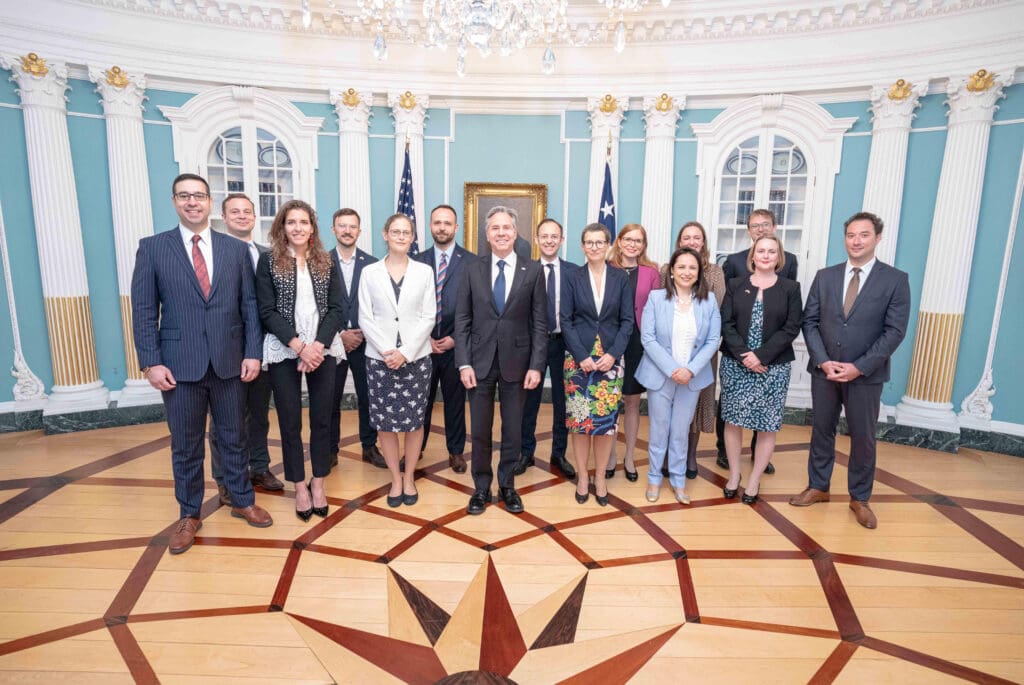
How challenging was it to become the acting head of this unit?
Everyone looked at me strangely when they found out that a foreign diplomat in her twenties was appointed as temporary supervisor. I enjoyed it because I still felt as part of the team; the only difference was that it was me who went to the management meetings and had to prepare the senior diplomats when they went for a particular visit. For instance, Tim Betts, who had previously been a diplomat in Hungary. I was very nervous when I placed the prep materials in front of him and his colleagues and began to speak.
He smiled and thanked me in Hungarian, but I was so excited that I didn’t even notice.
He sipped his coffee from a mug, grinning from behind it as I talked. It was only then that I noticed the Hungarian words on the mug were something like ‘Ismétlés a tudás anyja’ (‘Repetition is the mother of all learning’). It then occurred to me that Zsolt Szekeres had mentioned him to me earlier, noting that they were good friends and he had been close to the Coalition when he was in Hungary. Throughout my year in the U.S. Zsolt supported me, always helping whenever I needed anything. I enjoyed my work a lot and I didn’t leave when I was supposed to… My boss decided to keep me for another year, which was unprecedented at the U.S. State Department. In Morocco, he approached Hungarian Foreign Minister Péter Szijjártó without consulting me on the details of his plan. Standing next to them, I was stunned to overhear their conversation. Ultimately, they managed to extend my assignment for another year in the same department, allowing me to continue my previous work.
As a foreign exchange diplomat, you had to represent Hungary, right? What about your acting unit chief role? Didn’t it create a conflict of interest or put you in a delicate position?
There were a few interesting episodes when the American team members forgot that I was Hungarian. When the Ukrainian crisis started, my boss asked me why the Russians were fleeing through the STAN countries, and what the official U.S. stance was. I had to reply: ‘I don’t know, I can only tell you the official Hungarian position if you’re interested.’ Although I represented Hungary, I was placed in a special unit where I also had to represent the U.S. to other countries, which was particularly challenging. In contrast, a Turkish expert for example, being an exchange diplomat from another country was one of fifteen in his unit dealing with Turkey. He didn’t directly interact with other countries as a U.S. representative or travel elsewhere. My unit was unique, posing a special challenge. When we traveled, I had to represent the U.S. position to the outside world, but internally I had to represent the Hungarian position as a Hungarian diplomat. Moreover, when discussing topics like Ukraine, they couldn’t include me in certain discussions since I was indirectly affected as a Hungarian diplomat. They always had to be mindful of that.
You also had to pay attention to that, right?
Yes. I had to be intimately familiar with every detail of the topics I handled and the current Hungarian position on each issue. My colleagues were often cross-examining me, especially after the Ukrainian war broke out. Keeping up-to-date was challenging because I spent five days a week at the U.S. State Department. Officially, I had to report to the Hungarian Ambassador weekly, but had no official duties as being assigned to the U.S. State Department.
Did you manage to have a third year or how did you come back (again)?
During the second part of my second year, I was asked to extend my assignment again. This time they wanted to create a national expert position specifically for me with a two-year contract. They asked for permission from Hungary, but since this would have meant an additional Hungarian diplomatic status in Washington, DC, which was not feasible given the economic situation, Hungary unfortunately could not accept this proposal. Additionally, the next exchange diplomat had already been appointed by then. In August 2023 my foreign service ended. I returned home and resigned from the Hungarian Foreign Ministry. After a few weeks, I came back and started to prepare for the GRE exam, a prerequisite for admission to master’s and PhD programs. I had previously started a master’s degree at home with special permission, completing two semesters and many courses while in the U.S. I decided to switch to a U.S. graduate program and started preparing for the GRE exam. I applied to several universities, focusing primarily on American University as I heard many good things about the institution. Although I didn’t get admitted to their highly competitive PhD program, I was offered a scholarship for their two-year master’s program, which could later give me credit towards a PhD if I continued there. Meanwhile, Zsolt Szekeres asked me to be a fellow at the Hungarian Human Rights Foundation (HHRF) from September to December 2023, preparing for the arrival of RMDSZ (the ethnic Hungarians’ party in Romania), President Hunor Kelemen’s delegation. In January 2024, I became a Coalition fellow.
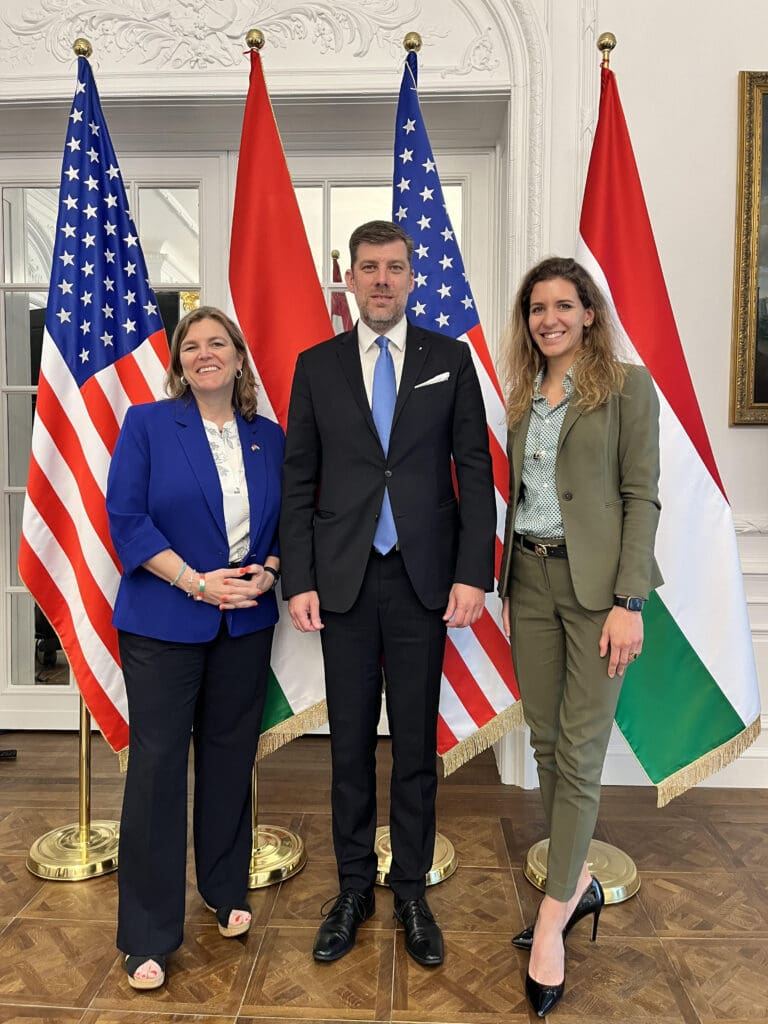
What are you doing currently at HAC besides your studies?
I handle a wide range of day-to-day activities. Firstly, I represent the organization in Washington, DC. Our president, Andrea Lauer Rice resides in Georgia, so I attend diaspora-related and other official events. Secondly, in Noémi’s absence, I am responsible for preparing for the Gala Dinner on 12 September and the Santa Claus Dinner in December, as well as coordinating the associated White House briefing. Thirdly, the Coalition is also involved in the Central East European Coalition (CEEC), an umbrella organization of national minority organizations of CEE nations. Our representative, Max Teleki, invited me to their weekly online meetings. We also host a monthly in-person meeting at the Kossuth House. Currently, we are organizing a panel discussion for the week before the NATO Summit (8–11 July) to outline the implications of Ukraine’s accession. By the way, one of my first major projects at the Coalition was compiling the history of Hungary’s accession to NATO. We produced a detailed summary, including personal stories and photos of notable individuals involved, available on our website.
Finally, let’s talk about your latest project, HYPE Network, which aims to offer a solution to a challenge of many Hungarian diaspora organizations: youth engagement and generational leadership succession.
Since moving here, I’ve noticed that the leadership of every Hungarian American organization I’ve encountered is mainly over 60–70 or even 80 years.
They all express difficulty in engaging younger generations.
We first became aware of this issue when Coalition members wanted to set up its Elderly Committee. The idea of a Youth Committee also came up, but there was uncertainty about who would be interested. While there are a few young volunteers, they lack an ongoing relationship with us. That’s when we started talking with Réka Veres Lenox, who was a HAC intern seven years ago and has been living here in DC since. She mentioned Albert-László Barabási’s son, Dániel, who received the Young Leaders Award at last October’s Gala, where I was awarded the LTP Alumni Award. Dani had previously mentioned to Réka that he was willing to help if needed. We decided to create an initiative to engage this generation. Our first step was to identify what HAC could offer that would interest young people, even those with no prior contact with the organization. This led to the idea of a leadership training program, as leadership skills are universally valuable for professionals and future leaders of Hungarian organizations. We also collaborated with Gábor Mózsi, the president of the Hungarian Club of Chicago. His journey exemplifies what we aim to highlight: having moved to the U.S. 10 years ago, he became an active member of the local Hungarian community, and a year ago, he became the club president due to his dedication and energy. By May, ahead of the Hungarian Summit in Florida, we had completed the outline of the leadership training program.
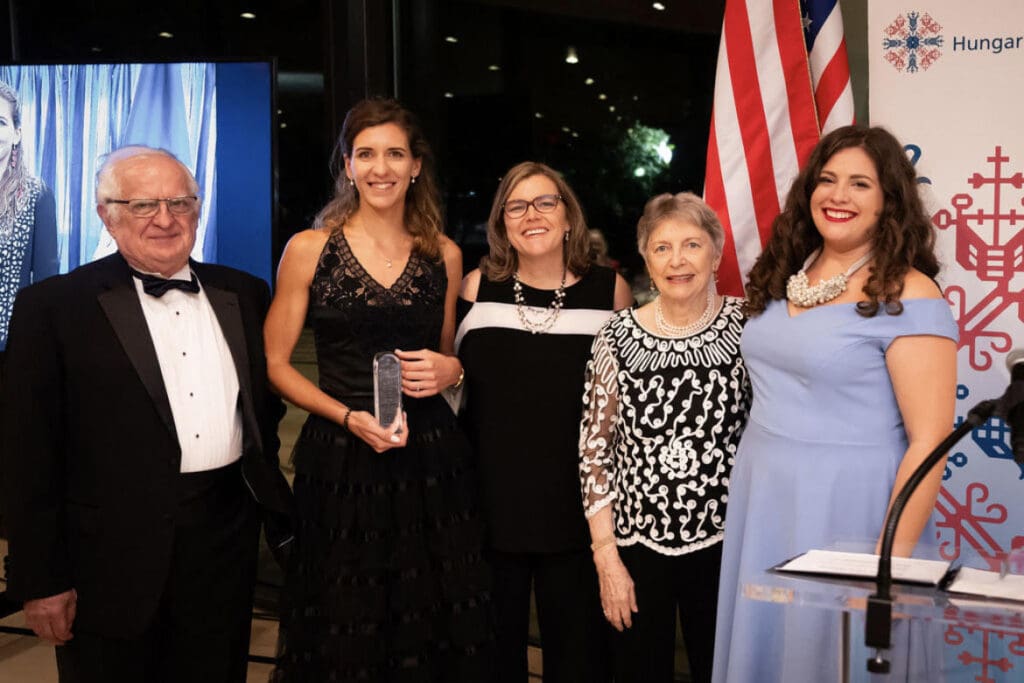
The news was announced at the Hungarian Summit founded by Piros Pazaurek. Let’s go through the key details, including its main goal.
The program, Hungarian Young Professionals Engagement (HYPE) Network, is an exclusive group accessible by completing the six-month leadership program. The inaugural participants, who began on 1 June 2024, have a unique opportunity to become co-founders of the program. This role comes with additional responsibility of promoting the program within their circles and nominating a professional from their network to be a speaker. While not all nominees will fit into the first six months, having a pipeline of participants and speakers is crucial for the program’s continuity. Consequently, the initial participants will need to play a significant role in sustaining the program annually. The HYPE Network program includes seven online interactive presentations, with six of them being mandatory. Upon completion, certificates will be awarded at the Santa Claus Dinner, and participants will be invited to the White House briefings, thereby linking the theoretical leadership training with the Coalition’s practical work. The program focuses on general leadership skills and participants can join the HAC Youth Committee. They will be connected with Hungarian organizations where they can assume leadership roles if they choose. Participants will have access to mentors, i.e. HAC members available for guidance. A key aspect of the program is familiarizing participants with the Coalition. With numerous local members, this connection helps participants discover Hungarian organizations within their professional fields or geographical areas. If we can engage their interest, they can continue to be active at the local level.
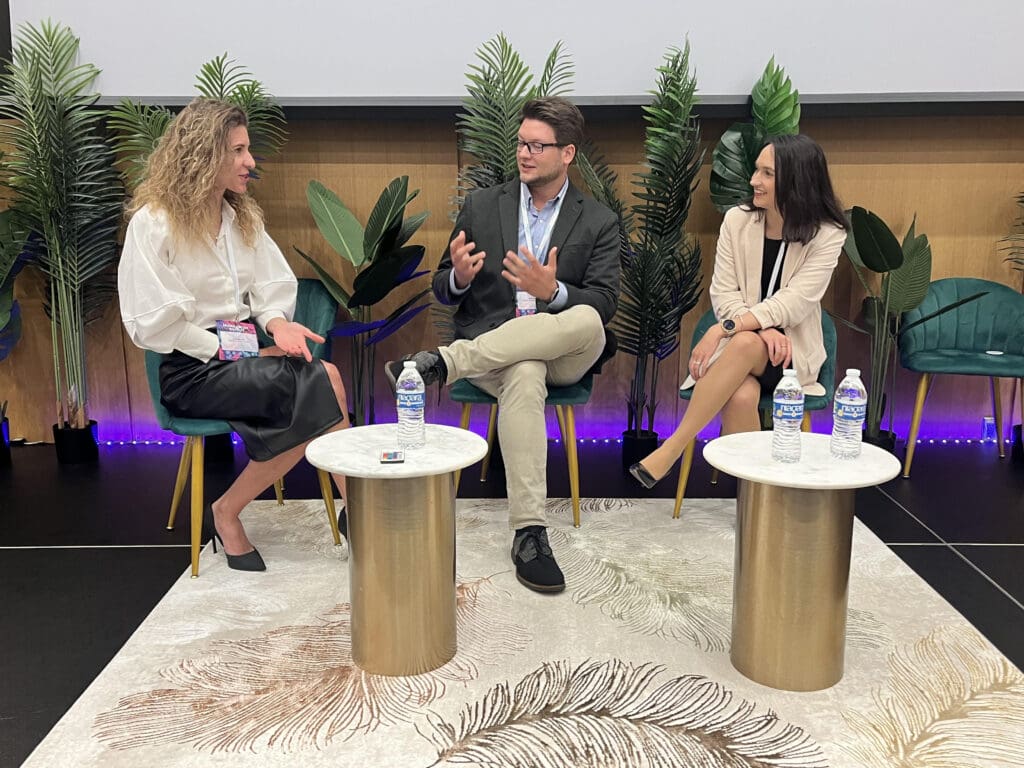
What do you know about the applicants and the speakers at this point?
We targeted the first 15–20 participants to come from as many states, cities and disciplines as possible. Barnabás Novák, a computer scientist from California, contacted us at the Hungarian Summit. One of his friends and his brother, who is in the film industry, are also interested in the training. The previously mentioned Ádám Béres, now studying to be a medical doctor at Ohio University, will be joining from there. Dániel Barabási, who lives in Boston and studies at Harvard, recommended Nicole Vereczkey from MIT. Elek Krizsán, Árpád Krizsán’s son, who runs the Hungarian Library of New York, also joined the team. Max’s son, Tibor, and Andrea’s son, Nicholas are also co-founders along with Klára Schmidt, Dóri Székely, as well as Évi Lukonits, another very active HAC member in Washington DC.
New York and New Jersey are not represented? What about the lecturers and mentors?
In this first cycle we’re not accepting additional applicants, but they will automatically be included for next year’s program. Our first three speakers have already been booked, while others are yet to be decided. Dexter Ingram, who works in the State Department, has a background in the FBI, Interpol and served in Afghanistan, will discuss people management. Nilda Bullain, a lawyer with Hungarian heritage, serves as Vice President of the International Center for Non-for-Profit Law (ICNL) will lecture on leadership. Peter Rupert, a serial entrepreneur, will share insights on company formation and management. The first three mentors are Andrea, Max and Piros. We are also welcoming mentor applications, as everyone is eager to connect with the youth. If they or their organizations are Coalition members and want to engage with young people, mentorship is a valuable opportunity for direct contact. The mentors’ resumes will be circulated among the participants; they will be introduced during the program. When we launched HYPE Network at the Hungarian Summit, Piros—who was involved from the start as a Coalition vice president responsible for youth engagement—offered the team members five free tickets to the next Hungarian Summit. This exemplifies what a mentor can do, but we haven’t outlined specific expectations from mentors, as we anticipate these relationships will develop naturally. For example, a participant from Cleveland who hasn’t connected with local organizations may be matched with a mentor from the same area. Mentors don’t have predefined roles, as the needs of participants vary based on age and experience.
Read more interviews:

